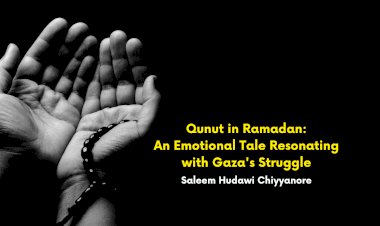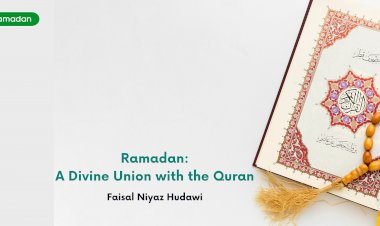Fasting Beyond Ramaḍān: A Lifelong Opportunity for Divine Closeness
As the blessed month of Ramaḍān departed, many believers feel a spiritual void, missing the sweetness of fasting, night prayers, and the heightened connection with Allah ﷻ. But the end of Ramaḍān does not signal the end of fasting. Rather, it opens a new chapter for those who desire to maintain that closeness with their Creator.
Fasting is not restricted to the thirty days of Ramaḍān; it is a lifelong act of devotion. In fact, it is one of the most beloved acts in the sight of Allah ﷻ. In the famous ḥadīth qudsī, Allah ﷻ says:
"الصوم لي وأنا أجزي به"
"Fasting is for Me, and I shall reward it." (Ṣaḥīḥ al-Bukhārī, 1761; Muslim, 1151)
This reward is not confined to the obligatory fasts of Ramaḍān. It includes every sincere fast done for His sake. The doors of voluntary fasting remain wide open throughout the year, offering us continual chances to purify our souls, tame our desires, and draw nearer to the Most Merciful.
Islam, in its divine wisdom, has recommended numerous occasions outside Ramaḍān for fasting—each with its own spiritual significance and unique reward. From the six days of Shawwāl to the fasts on Mondays and Thursdays, and the White Days (Ayyām al-Bīḍ), these are opportunities to remain spiritually charged, disciplined, and connected to Allah ﷻ beyond the month of Ramaḍān.
It is from the profound wisdom of Allah ﷻ that He legislated acts of devotion beyond the obligatory ones—acts through which the servant may draw closer to Him and attain His love. These voluntary deeds, from the same category as the obligatory acts, serve as a means to elevate one’s spiritual rank and compensate for any deficiencies in the required duties.
The Prophet ﷺ narrates from his Lord in the ḥadīth qudsī:
"وما تقرّب إليّ عبدي بشيءٍ أحبّ إليّ ممّا افترضتُ عليه، وما يزال عبدي يتقرّب إليّ بالنوافل حتى أحبّه، فإذا أحببته كنت سمعه الذي يسمع به، وبصره الذي يُبصر به، ويده التي يبطش بها، ورجله التي يمشي بها، وإن سألني لأعطينّه، ولئن استعاذني لأعيذنّه"
(Ṣaḥīḥ al-Bukhārī, 6502)
"My servant does not draw near to Me with anything more beloved to Me than what I have made obligatory upon him. And My servant continues to draw near to Me through voluntary acts (nawāfil) until I love him. And when I love him, I become his hearing with which he hears, his sight with which he sees, his hand with which he strikes, and his foot with which he walks. If he asks Me, I will surely give him, and if he seeks refuge in Me, I will surely protect him."
(Ṣaḥīḥ al-Bukhārī, 6502)
This hadith is a beautiful testimony to the power of nawāfil (voluntary acts), including voluntary fasting. They are not mere additions, but a path to divine companionship and protection.
Six Days of Shawwāl
Among these is the fasting of six days in the month of Shawwāl, immediately after the completion of Ramaḍān.
Fasting six days of Shawwāl is a highly recommended Sunnah, not an obligation. It is a noble opportunity for every believer who seeks to maintain the spiritual momentum built during Ramaḍān. The Prophet ﷺ said:
"Whoever fasts Ramaḍān and follows it with six days of Shawwāl, it is as if he has fasted the entire year."
(Ṣaḥīḥ Muslim; also narrated by Abū Dāwūd, al-Tirmidhī, al-Nasā’ī, and Ibn Mājah)
The Prophet ﷺ explained this reward with clarity:
"Fasting Ramaḍān is like fasting ten months, and fasting six days (of Shawwāl) is like fasting two months—thus completing the reward of an entire year."
(Reported by al-Nasā’ī, Ibn Mājah)
Scholars from the Shāfiʿī and Ḥanbalī schools have noted that fasting these six days equates to the reward of a year’s worth of obligatory fasting. And even beyond this, the general principle applies: “Whoever comes with a good deed shall have ten times the like thereof” (Qur’an, 6:160).
Another great wisdom in observing the six fasts of Shawwāl is that they serve as a means of completing and perfecting one’s Ramaḍān fasts. No one’s fast in Ramaḍān is free from some shortcoming—whether through forgetfulness, heedlessness, or minor sins. On the Day of Judgement, voluntary deeds will be used to fill the gaps in obligatory ones.
The Prophet ﷺ said:
"The first matter that the people will be brought to account for on the Day of Judgment is the prayer. Allah will say to His angels—although He knows best—'Look at My servant’s prayers, are they complete or deficient?’ If they are complete, it will be recorded as such, and if they are lacking, He will say, 'See if My servant has voluntary prayers,’ and the rest of the obligatory will be completed with them."
(Sunan Abū Dāwūd)
Fasting, like prayer, follows this same divine system of compensation.
It is not a condition that the six fasts of Shawwāl be observed consecutively. One may fast them in succession or spread them out throughout the month—both are permissible and valid. However, hastening to perform them earlier is more virtuous, as it reflects eagerness in worship. Allah ﷻ says:
"So race to [all that is] good." (Qur’ān 2:148)
And: "Hasten to forgiveness from your Lord…" (Qur’ān 3:133)
And Mūsā (ʿalayhis-salām) said: "And I hastened to You, my Lord, so that You may be pleased." (Qur’ān 20:84)
Delaying voluntary worship often leads to missing it due to unforeseen obstacles, distractions, or loss of motivation. Therefore, the Shāfiʿī school and some Ḥanbalī scholars recommended fasting the six days consecutively at the beginning of Shawwāl, though they agreed that it is not required.
Imām al-Nawawī (raḥimahullāh) said:
“Our scholars have stated: It is recommended to fast six days of Shawwāl, based on this ḥadīth. They further said: It is recommended to fast them consecutively at the beginning of Shawwāl. However, if one separates them or delays them even beyond Shawwāl, it is still valid and he will have fulfilled the Sunnah, due to the general and unrestricted nature of the ḥadīth. There is no disagreement on this point among us. The same was stated by Aḥmad and Dāwūd.”
(Al-Majmūʿ Sharḥ al-Muhadhdhab)
Thus, whether done consecutively or scattered, fasting these six days is a blessed Sunnah, and one should strive to complete them before the month of Shawwāl ends.
Weekly Voluntary Fasting: Mondays and Thursdays
Among the types of voluntary fasts legislated in Islam are those tied to specific times—some are weekly, others monthly, and some annually. One of the most consistent and beloved weekly practices of the Prophet ﷺ was fasting on Mondays and Thursdays.
ʿĀʾishah (رضي الله عنها) said:
"The Messenger of Allah ﷺ used to be keen on fasting Mondays and Thursdays."
(Narrated by al-Nasāʾī, 2320)
When asked about the reason behind fasting on these days, the Prophet ﷺ explained:
"These are the days on which deeds are presented before the Lord of the Worlds, and I love that my deeds be presented while I am fasting."
(Narrated by al-Nasāʾī, 2358; Ibn Mājah, 1740; Aḥmad, 8161)
In another narration, when he ﷺ was asked specifically about fasting on Mondays, he said:
"That is the day I was born, and the day on which revelation was sent down to me."
(Ṣaḥīḥ Muslim, 1162)
These fasts, though not obligatory, were part of the regular routine of the Prophet ﷺ. They offer believers a beautiful opportunity to stay spiritually active throughout the week, to renew their intention, and to present their deeds to Allah ﷻ while in a state of devotion and humility.
Monthly Voluntary Fasting: The White Days
Among the regular voluntary fasts encouraged in the Sunnah is the practice of fasting three days from every lunar month. This was a consistent recommendation of the Prophet ﷺ to his close companions.
Abū Hurayrah (رضي الله عنه) reported:
"My close friend (the Prophet ﷺ) advised me to do three things which I shall never abandon until I die: fasting three days of every month, praying Ḍuḥā, and sleeping in a state of Witr."
(Ṣaḥīḥ al-Bukhārī, 1178; Ṣaḥīḥ Muslim, 721)
While fasting on any three days of the lunar month fulfils the Sunnah, it is especially recommended to fast on the Ayyām al-Bīḍ—the "White Days": the 13th, 14th, and 15th of each Islamic month. They are called "white" due to the brightness of the moon on those nights.
Abū Dharr (رضي الله عنه) said:
"The Messenger of Allah ﷺ said to me: ‘If you fast any days in the month, then fast the 13th, 14th, and 15th.’"
(Narrated by al-Nasāʾī, 2424; Ibn Mājah, 1707; Aḥmad, 210)
This regular practice nurtures spiritual discipline and allows the believer to maintain the essence of fasting throughout the year, even outside special occasions. The cumulative effect of such fasting, as with all acts of devotion, leads to Allah’s pleasure and protection, while offering an ongoing purification of the heart and soul.
Annual Voluntary Fasting: Blessed Days and Sacred Periods
Among the voluntary fasts, some are tied to specific days of the year, while others span special periods in the Islamic calendar. Each of these occasions is marked by immense spiritual opportunity and divine reward.
- The Day of ʿĀshūrāʾ (10th of Muḥarram)
Ibn ʿAbbās (رضي الله عنهما) said:
"I never saw the Prophet ﷺ so keen to fast a day and prefer it over others except this day—the Day of ʿĀshūrāʾ—and this month, meaning Ramaḍān."
(Ṣaḥīḥ al-Bukhārī, 2006; Ṣaḥīḥ Muslim, 1132)
Fasting on ʿĀshūrāʾ expiates the sins of the previous year, and it is Sunnah to fast a day before or after it to distinguish the Muslim practice from that of the Jews, as instructed by the Prophet ﷺ.
- The Day of ʿArafah (9th of Dhul-Ḥijjah)
This fast holds a unique virtue for those not performing Ḥajj. The Prophet ﷺ said:
"Fasting the Day of ʿArafah, I hope from Allah it will expiate (the sins of) the year before and the year after. And fasting the Day of ʿĀshūrāʾ, I hope from Allah it will expiate the year before."
(Ṣaḥīḥ Muslim, 1162)
- The Six Days of Shawwāl
Already mentioned earlier in detail, these six fasts following Ramaḍān equate in reward to a full year’s fast when combined with Ramaḍān, as per the Prophet’s ﷺ saying:
"Whoever fasts Ramaḍān and follows it with six days of Shawwāl, it is as if he has fasted for the entire year."
(Ṣaḥīḥ Muslim, 1164)
- The Month of Muḥarram
Aside from ʿĀshūrāʾ, it is recommended to fast during this sacred month in general. The Prophet ﷺ said:
"The best fasting after Ramaḍān is in the month of Allah, al-Muḥarram; and the best prayer after the obligatory is night prayer."
(Ṣaḥīḥ Muslim, 1163)
- The Month of Shaʿbān
This month served as a spiritual prelude to Ramaḍān, in which the Prophet ﷺ would increase his fasting more than any other month outside Ramaḍān.
ʿĀʾishah (رضي الله عنها) said:
"The Messenger of Allah ﷺ used to fast (so frequently) in Shaʿbān that we would say he never stops fasting. I never saw him fast an entire month except Ramaḍān, and I never saw him fast more in any month than Shaʿbān."
(Ṣaḥīḥ al-Bukhārī, 1969; Ṣaḥīḥ Muslim, 1156)
The General Merit of Voluntary Fasting
The virtues of voluntary fasting are not limited to specific days. Any day fasted purely for Allah’s sake is immensely rewarding. The Prophet ﷺ said:
"Whoever fasts a day in the path of Allah, Allah will distance his face from the Fire by seventy years."
(Sunan al-Nasāʾī, 2247)
Unrestricted Voluntary Fasting and Fasting Tied to Personal Circumstances
In addition to the fixed occasions for fasting, Islam encourages unrestricted voluntary fasting (al-ṣiyām al-muṭlaq)—fasting on any day of the year that is not prohibited. A Muslim may offer fasts at will as an act of devotion, seeking Allah’s closeness and reward.
However, there are days when fasting is prohibited:
- The two Eids: Eid al-Fiṭr and Eid al-Aḍḥā.
- The three days after Eid al-Aḍḥā (Ayyām al-Tashrīq), except for the pilgrim performing Tamattuʿ or Qirān who has no sacrificial animal.
- Fasting Friday alone is not recommended without fasting a day before or after, unless it coincides with a regular fast.
Outside of these, the door remains open for voluntary fasts throughout the year.
One of the most beloved forms of ṣiyām muṭlaq is the fast of Prophet Dāwūd (ʿalayhis-salām), as described by the Prophet ﷺ:
"The most beloved prayer to Allah is the prayer of Dāwūd (peace be upon him), and the most beloved fasting to Allah is the fasting of Dāwūd: he would fast one day and break his fast the next. He would sleep half the night, pray one-third of it, and then sleep one-sixth."
(Ṣaḥīḥ al-Bukhārī, 1131; Ṣaḥīḥ Muslim, 1159)
This pattern, while highly virtuous, is best suited for those capable of maintaining it without harming their strength or other religious duties. In another narration, the Prophet ﷺ said:
"He used to fast one day and break the next, and he would not flee when facing the enemy."
(Ṣaḥīḥ al-Bukhārī, 1977; Ṣaḥīḥ Muslim, 1159)
This indicates that the superiority of such fasting is conditional on one’s strength and capacity, especially if one is engaged in duties requiring physical or mental focus.
Fasting Based on Personal Conditions
Voluntary fasting is also recommended in specific personal circumstances. One such case is that of the unmarried young man who is unable to marry. Fasting in this case becomes a protective means, as taught by the Prophet ﷺ.
ʿAbdullāh ibn Masʿūd (رضي الله عنه) narrated:
"We were with the Prophet ﷺ as young men who could not afford marriage. So the Messenger of Allah ﷺ said: 'O young men, whoever among you is able to marry, let him do so, for it is more effective in lowering the gaze and guarding chastity. And whoever is not able to, let him fast, for it will be a shield for him.'"
(Ṣaḥīḥ al-Bukhārī, 5066; Ṣaḥīḥ Muslim, 1400)
Here, fasting serves not only as an act of worship but also as a moral safeguard. The more one is exposed to temptations and distractions, the more emphasised this form of fasting becomes.
Voluntary fasting is a rich field of devotion, filled with opportunities that go far beyond Ramaḍān. Whether tied to specific days, months, or circumstances—or left to the believer's own initiative—it is a sign of sincere love for Allah ﷻ. It trains the soul, protects the heart, and opens the doors of divine closeness and reward, as promised in the sacred ḥadīth:
"Fasting is for Me, and I shall reward it Myself."
(Ṣaḥīḥ al-Bukhārī, 1761; Ṣaḥīḥ Muslim, 1151)
So let every seeker of Allah ﷻ hold firm to this noble act throughout the year, reviving the Sunnah, nurturing taqwā, and walking the path of the righteous.
Disclaimer
The views expressed in this article are the author’s own and do not necessarily mirror Islamonweb’s editorial stance.
























Leave A Comment